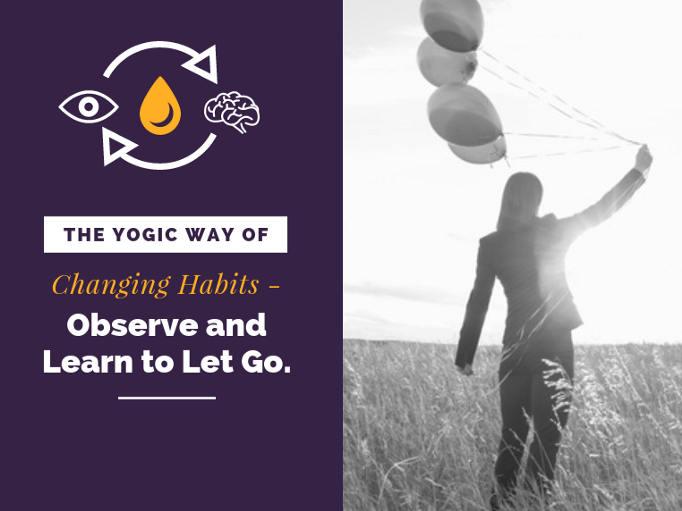A student was practicing Yogic postures for the first time. The instruction was to simply observe the breath while moving from normal position to the asana pose. The task was to keep mind from wandering, every single time it started to ramble.
Everything was simple in the beginning. But soon enough he found himself meditating in silent spaces, sweating in the middle of winter when doing a few surya namaskars and taking naps whenever he got the chance to. Eventually everything turned very exhausting. The instruction was simple enough yet the student was missing the basic lesson — Observing and Letting Go!!
The Science of Brain — Attention and Concentration
When we try to focus attention on something, most of us find ourselves drifting off into a daydream or feeling a sudden urge to check notifications, emails, facebook messages, instagram updates and so on.
For example, whenever we come across a tempting food item, our brain is like: wow, that looks delicious! We eat it, taste the yummy flavors and fall in love with that momentary feeling. Our body sends a signal to our brain to memorize what we’re eating and where we found it. This context-dependent memory gets stored and we learn to repeat the process next time by default. It goes like: See food, Eat food, Feel good, Repeat!
Next time, the brain does more than just remembering the experience. Our clever brain says, “You know what? Next time you feel bad, why don’t you eat something good so you’ll feel better?” We thank our brain for the great thought and quickly learn that if we eat chocolate when we’re depressed or sad and we feel better.
Keith Barry shows us how our brains can fool our bodies:
It is all the same process, just a different trigger. Instead of hunger pangs being felt, it turns into an emotional signal, the feeling of dissatisfaction provokes that urge to eat.
In our teenage years; whenever we saw someone smoking a cigarette, the first thought that popped into our head was, damn, that person is cool. So we started smoking. Again the same pattern: See cool, smoke to be cool, feel good. Repeat. That’s how it goes. Each time we do this, we learn to repeat the process and it becomes a habit. Whenever we feel stressed out, it activates that urge to smoke a cigarette or to eat something.
With such brain processes, we are truly killing ourselves through these habits. Obesity and smoking are some of the major causes of morbidity and mortality in the world. Obesity and smoking have a substantially increased risk of surgical complications and increasing morbidity and mortality.
So back to the point, what if instead of fighting our brains, or forcing ourselves to pay attention, we just got really curious about what was happening in our momentary experience?
Now, just like someone trying to force himself to pay attention to his breath, one could try to force themselves to quit smoking. But many people had already tried this before and failed at it multiple times.
स तु दीर्घकालनैरन्तर्यसत्कारासेवितो दृढभूमिः॥१४॥
Sa tu dīrghakālanairantaryasatkārāsevito dṛḍhabhūmiḥ||14||
And practice, when endowed with an uninterrupted and true devotional attitude for long time, has certainly firm foundations ||14||
The Yogic Way of Changing Habits
The Yogic way of life calls for dropping the bit about forcing and rather focusing on being curious. This is because the prefrontal cortex, understands on an intellectual level that we shouldn’t smoke. And it tries it’s best to help us change how we behave, to help us give up smoking, to help us stop eating over and over again. Unfortunately, it goes inactive when we get stressed out, which isn’t that helpful.
We’re more likely to do things such as yell or become angry when we’re stressed out or tired, even though we know it’s not going to be helpful.
When the prefrontal cortex goes inactive due to a stressed situation, we fall back into our old habits, which is why this disappointment is so important; realizing what we actually receive from these habits helps us to decipher them at a deeper level.
And this is what an alert, watchful mind is all about- Observing clearly what we get when we get caught up in our behaviors, becoming uninterested anymore and naturally letting go.
This isn’t to say that, some power will get us to magically quit smoking/overeating or any other bad habit. But over time, as we start observing more and more clearly the outcomes of our actions, we let go of old habits.
Mindfulness is all about in getting close and personal with our own selves. We should be willing to turn inwards rather than forcing ourselves to get rid of our cravings. And this inclination to turn toward our experience comes with curiosity.
When we get curious, we start to notice that our desires and urges are simply made up of bodily as well as mental sensations — , there’s discomfort, there’s tension, there’s restlessness — and that these sensations come and go.
Our curiosity can help us step out of our reactive habit patterns founded on fear. Recent studies have found that awareness of mind obtained through following the Yogic path has helped people quit smoking and other such habits.
When scientists studied the brains of experienced and regular yoga practitioners, they found that parts of a neural network of self-referential processing also known as the default mode network were active. The Posterior cingulate cortex, is activated not through craving itself but when we get caught up and sucked in it, and it takes us for a ride.
On the opposite, when we let go and step out of the process just by being curiously aware of what’s happening — this same area in our brain quiets down without stress.
Even if you don’t smoke or have a well balanced diet, maybe the next time you feel this urge to check your email when you’re bored. Tap into this natural capacity, just be curiously aware of what’s happening in your body and mind in that instance.
It will just be another chance to either keep alive one of our endless and exhaustive habit patterns or step out of it. Instead of compulsively checking out that notification — notice the urge, get curious, feel the joy of letting go and repeat.

